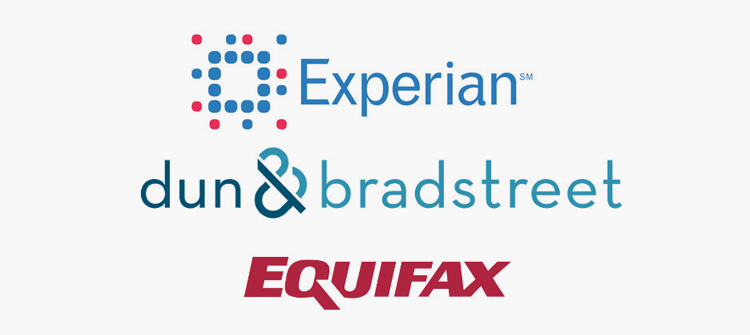
Having a good business credit score is important to start, support, or grow a company. For small businesses, lenders may ask to check both the owner's credit scores and the company's. To receive their business credit scores, business owners must contact the three major business credit scoring firms: Equifax, Experian, or Dun and Bradstreet.
A business credit score, similar to a personal credit score, is the number that determines the creditworthiness of the company. Lenders require a business credit check to understand the extent to which the company can successfully pay back their loans. A good credit report also raises the chances of becoming a business customer. However, a high personal credit score isn't correlated to a high business credit check since each is calculated using a different model.
Every credit scoring company uses different algorithms to calculate the company's credit score. However, they all consider:
Consumer credit scoring companies use a scale from 300 to 850. Generally, business credit scoring companies use scores ranging from 0 to 100. A score of 76 is considered acceptable. A higher credit score signifies that the company doesn't have a late payment in their credit history.

Before starting with their business credit, ensure you are operating a properly documented company. When opening a checking or savings account for their businesses, owners must use the ID number that the IRS provided them in the form of either an Employer Identification Number (EIN) or a Federal Tax Identification Number (FIN). After setting up the account, owners have to register their businesses with a credit reporting agency.
You might be less liable for business debts if you form an LLC or a corporation instead of making the business a partnership or a sole proprietorship. By doing so, the owner's personal credit score is disassociated from the business credit report to an extent.
The most critical factor in increasing any credit score is to pay back borrowed loans on time. It is also an excellent habit to start paying back bills before the due date to improve the company's business credit score. This is also beneficial in maintaining good relationships with creditors.
Another vital factor in increasing business credit scores is to try working with companies, lenders, and suppliers that report to the credit bureaus. However, reporting to the credit bureaus is not a requirement; hence, not all clients report the company's good habits.
It is also smart to use a small business credit card from a credit card company that reports the payments to a credit card bureau. Besides, most small business cards provide rewards or cashback.
Also, reducing existing debt is a significant factor in maintaining a good business credit check. Business owners should pay off any business credit card debt, pay the vendors, and clear out any other outstanding balances.
Moreover, meeting business credit requirements is essential. Business owners must always correctly update any changes made to their phone line, address, license, and other data and documents to meet those requirements.
As mentioned earlier, the personal credit score for small business owners does matter. It is best for big-business owners to maintain excellent personal and business credit scores. Some credit lenders use blended scoring tools that look at a potential borrower's personal and business credit history. Having both scores as high as possible may decrease the risks of rejection.

Most business owners know their personal credit score; however, they should also monitor their business credit score because understanding the score will help owners understand their chances of being approved for a loan.
Each of the three major business credit bureaus, Equifax, Experian, and Dun & Bradstreet, has its own algorithm to determine businesses' creditworthiness. You might be able to avoid unpleasant application surprises if you know how each bureau operates.
Equifax is one of the most well-known credit bureaus operating in the United States. It offers both consumer and business credit scoring services. Equifax provides a business payment index score by looking at the company's payment history for the past year. Equifax also provides business credit risk and failure scores by evaluating payment trends, credit history, and public records.
The Equifax scoring ranges from 101 to 992, where a score above 565 is considered acceptable.
Equifax charges $99.95 for a single report. Business owners can purchase their business credit report from the company's official website. Equifax also offers a deal of a pack of five reports for $399.95. they also provide monthly credit monitoring services for $5.99.
Another well-known credit bureau is Experian. It offers credit scores called Intelliscore, where the scoring ranges from 1 to 100. A score above 75 is considered low risk. Experian constructs its business credit score based upon public records, payment history, vendor payments, age of accounts, collections, amount of debt, and general business information. Lenders and banks often use Intelliscore.
Experian charges $39.95 for one-time access, while the annual subscription costs $179. Those wanting to purchase their business credit report can do so from the company's official website.
Since the start of the pandemic, Experian has been offering all American-owned small businesses free access to their credit reports to help them grow in difficult times.
Dun & Bradstreet is another reputable credit reporting agency in the states. Its most popular business credit scoring model to determine creditworthiness is called PAYDEX. To calculate the credit score, it takes into consideration the payment history of the company and payment information from the past two years. The score ranges from 1 to 100. A business credit report above 79 is considered good.
Dun & Bradstreet charges $99.95 for one-time credit reports. A standalone business credit report costs $189. The company also offers monthly services packages starting from $149. Business owners can buy their business credit report from the official website of Dun & Bradstreet.
It's important to note that if business owners notice any false information on their business credit report, they have the right to dispute with the credit bureau and provide the supporting documents.

There is no doubt that a history of late payments is the most significant factor in lowering a business credit score. However, there are some other factors too that business owners should take into consideration.
Closing an account may have a negative impact on the business credit score. It lowers the available credit amount, which can harm the debt utilization ratio.
It can also minimize the business's credit history, as the payment history may no longer be available.
Operating a business with a co-owner means shared responsibilities, as well as shared punishments. Late payment from one of the owners may show on the business credit score. Also, owning less than 50% of the business might lower your chances of being eligible for a loan. The owner who has a bigger share in the company may need to sign an authorization document.
If a business declares bankruptcy, a significant number of points will be deducted from their business credit score. This factor also influences a business owner's eligibility to apply for a loan, mostly if the company was bankrupt in less than six months. Some creditors might stop lending money for at least two years.

Some companies have a high score but still are not able to receive funding. The following issues can keep you from finding a loan.
Having too many credit lines might expose the borrower to too many risks. Lenders may assess that the individual has too many credits already.
When lenders notice a decline in the business's revenue, they might reconsider handing out a business loan. This may signify that the company is having some trouble and will not have the ability to pay back the borrowed amount on time.
When banks offer business loans, they tend to check the borrower's personal history. Business owners with criminal backgrounds may not receive a loan. Before considering a loan application from an ex-convict, the Small Business Administration requires at least five years to pass.
There are many ways you can hurt or improve your score. It is impossible to list them all. However, if you follow these three general rules, you should be able to maintain a good credit score:
Having a good credit score can help set your business on the right track for growth. However, growth won't happen overnight. If business owners avoid mistakes, the score may continuously rise. Hiring a professional accountant will be an excellent asset for the company to stay on the right track.